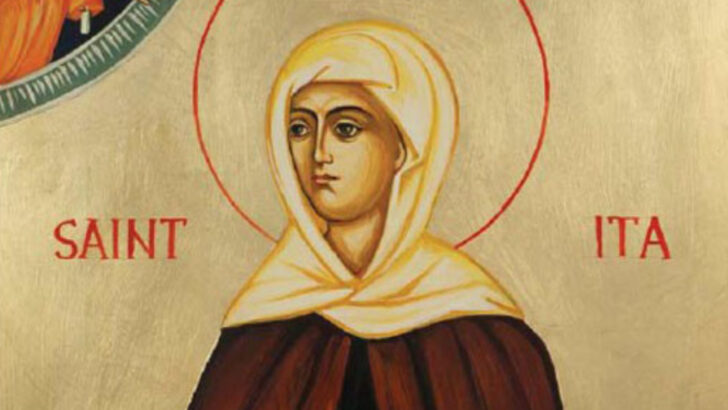St Ita of Ireland, also known as ‘the Brigid of Munster’, is one of the most revered saints in Irish Catholic tradition. Born around 480 in Co. Waterford, she grew to embody the virtues of piety, compassion, and wisdom. She is celebrated on January 15 and holds a special place in the hearts of Irish Catholics as the patron saint of Killeedy, a small village in Co. Limerick where she established her convent.
Ita was baptised and named Deirdre or Dorothea, but she adopted the name Ita, meaning ‘thirst for holiness’, in reflection of her spiritual aspirations. From an early age, she showed remarkable devotion to God, ignoring the path of marriage that many expected of her. Despite the resistance of her family, Ita pursued a life dedicated to Christ. Her determination to follow her calling was proof of her profound spiritual strength.
Ita sought solitude and a place to serve God in peace, eventually founding a religious community in Killeedy, Co. Limerick. This site became a sanctuary for prayer, learning, and charity. Ita’s convent attracted many women looking for spiritual guidance, as well as children and young people eager to benefit from her wisdom and teachings.
St Ita’s role as a teacher and mentor earned her the affectionate title of the ‘Foster mother of the saints of Ireland’. She was known for nurturing the spiritual growth of young boys, preparing them for roles as future leaders in the Church. Among her most famous pupils was St Brendan the Navigator, who credited Ita with introducing to him the virtues that shaped his extraordinary missionary call.
Her teaching emphasised three core virtues: faith in God, simplicity of life, and generosity of spirit. Her care extended beyond mere instruction. Ita was a true mother figure, offering profound emotional and spiritual support to those in her care.
Ita’s life was marked by miracles that displayed her holiness. She was known for her healing abilities and her prayers were believed to bring divine intervention in times of distress. Stories of her miraculous acts, such as curing illnesses and providing food during famine, solidified her reputation as a deeply compassionate and holy woman.
Ita also lived a life of austerity. Simplicity and penance were forms of spiritual discipline in her life. Her devotion to Christ was often expressed through hymns and prayers, many of which she composed herself. Her life reminds us of the power of faith and the importance of nurturing spiritual growth in others.


 Renata Milán Morales
Renata Milán Morales
